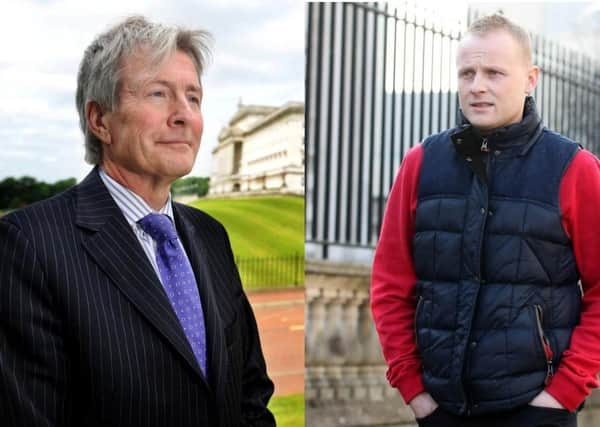Under cross-examination from loyalist Jamie Bryson, libel lawyer Paul Tweed refuses to name five Nama case clients


Paul Tweed, a solicitor who specialises in defamation and has represented a host of celebrity clients, today found himself being cross-examined by Mr Bryson during a preliminary investigation hearing at Downpatrick Magistrates Court.
Mr Bryson is charged along with two republicans – former MLA Daithi McKay from Loughan Road, Dunamanagh, and Sinn Féin member Thomas O’Hara from Lisnahunshin Road, Cullybackey - with conspiracy to commit misconduct in a public office.
Advertisement
Hide AdAdvertisement
Hide AdAll three deny the charges and sought a preliminary investigation, which began on Monday, to have the case thrown out before trial.
The case relates to allegations of corruption around the sale of Nama’s £1.1 billion Northern Ireland property portfolio and centres on a 2015 Stormont committee hearing when Mr Bryson alleged – using Assembly privilege, meaning that he could not be sued for libel – that Peter Robinson stood to benefit from the £7m moved to an offshore bank account as part of the deal.
Mr Robinson immediately rebutted the allegation that the money was earmarked for five individuals, of whom he was one, saying he was never offered “a single penny”.
It subsequently emerged that there had been prior contact between the loyalist and Mr McKay, the Sinn Féin chairman of the Stormont committee where he made the claims.
Advertisement
Hide AdAdvertisement
Hide AdToday Mr Bryson, who is representing himself, questioned Mr Tweed about the lawyer’s attempts on behalf of five unnamed clients to prevent his allegations from being heard publicly at the committee.
Mr Bryson asked the lawyer if he had written to the Stormont committee “seeking to have my evidence concealed from the public; isn’t that correct?”
Mr Tweed replied; “That’s correct. I mean, this is a matter of public record.” He later said that they did not want the allegations suppressed, but brought to a more appropriate forum such as a court.
Arguing that the charges which he faces require evidence of “public harm”, Mr Bryson pressed the lawyer to set out what harm had been caused by his evidence. Mr Tweed replied: “I am not prepared to go into evidence that relates to solicitor-client confidentiality.”
Advertisement
Hide AdAdvertisement
Hide AdPressed by Mr Bryson to name the individuals on whose behalf he had acted, Mr Tweed said he would not do so because it was privileged.
However, district judge Mark McGarrity interjected to question whether he could claim privilege over his clients’ names. After legal discussion and a brief adjournment, the judge said he could not claim legal privilege and Mr Tweed said he was then prepared to name them.
The judge then said: “I am not directing you to do that...I suppose you can assert privilege but it is a matter for me as to whether or not it exists and I don’t consider that in these circumstances it does presently exist.”
Mr Tweed then replied: “I am claiming privilege on the basis I think it unnecessary to name the clients...I have no authority from my clients to release their names but there is no sinister undertones that Mr Bryson appears to be suggesting here”.
Advertisement
Hide AdAdvertisement
Hide AdLater, Mr Bryson said that Mr Tweed had acted for the then First Minister, Peter Robinson, in writing to Amazon to seek the removal from sale of his book about Nama.
He asked the lawyer: “Was Mr Peter Robinson one of the people who instructed you to write to the DFP committee to try and conceal my evidence?” Mr Tweed replied: “I am not commenting on that.”
Later, Mr Bryson questioned retired PSNI superintendent Kevin Geddes, who was the first investigating officer on the case after DUP chairman Lord Morrow made a criminal complaint in 2016.
The court was told that Lord Morrow alleged that Bryson’s evidence was used to “attack the name and reputation” of Mr Robinson. Mr Geddes said that he had gone to the then Assembly commissioner for standards, Douglas Bain, for advice on whether Assembly procedures had been subverted.
Advertisement
Hide AdAdvertisement
Hide AdUltimately, he said that the police had taken their evidence to the PPS which had decided that a criminal prosecution should be brought.
Mr Bryson put it to him that he was saying the public harm was not caused to Mr Robinson, but was caused by a breach of Assembly procedural rules. Mr Geddes replied: “It’s all the same thing.”
Prosecution barrister Toby Hedworth QC asked Judge McGarrity if he would consider placing reporting restrictions on the hearings. However, the judge declined to do so. The case continues tomorrow.
READ MORE:
Advertisement
Hide AdAdvertisement
Hide AdAdvertisement
Hide AdAdvertisement
Hide Ad——— ———
A message from the Editor:
Advertisement
Hide AdAdvertisement
Hide AdThank you for reading this story on our website. While I have your attention, I also have an important request to make of you.
With the coronavirus lockdown having a major impact on many of our advertisers — and consequently the revenue we receive — we are more reliant than ever on you taking out a digital subscription.
Subscribe to newsletter.co.uk and enjoy unlimited access to the best Northern Ireland and UK news and information online and on our app. With a digital subscription, you can read more than 5 articles, see fewer ads, enjoy faster load times, and get access to exclusive newsletters and content. Visit https://www.newsletter.co.uk/subscriptions now to sign up.
Our journalism costs money and we rely on advertising, print and digital revenues to help to support them. By supporting us, we are able to support you in providing trusted, fact-checked content for this website.
Alistair Bushe
Editor